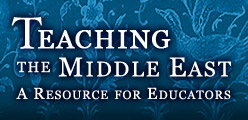Islam, Science, and Modernity
A common stereotype sees Islam as a religion in conflict with, or hostile to, modernity and democracy. The identity of modern Middle Easterners, according to this line of thinking, could not encompass both Islamic and modern values. Yet from the nineteenth century, Islamic religious reformers have attempted to contemplate the ways in which modernity and the Islamic faith could coexist with each other. Religious reformers like Jamal al-Din al-Afghani, Muhammad 'Abduh, Rif'at Rafi al-Tahtawi, Rashid Rida, and Qasim Amin tried to think about the relationship between Islam, science, and modernity. They argued that ideas about democracy and science were also found in the Islamic tradition. For instance, the tribal practice of consultation (mushawara, shura) was understood as the Islamic basis for constitutionalism and democracy. They likewise maintained that Islamic law could be changed according to circumstances and consequently called to re-interpret certain laws in a way which considers the needs of the believers in the modern world. Third, such reformers contended that Islam had never objected to the scientific inquiry. In fact, during the Middle Ages, Muslims were engaged in numerous scientific projects while Europeans suffered from oppression of free thought. These ideas established important conversations regarding the identities of modern Muslims. In fact, similar debates occur today in the Middle East, on issues like genetics, stem-cell research, and cloning.
True, not all members of the religious establishment happily accepted such views. Yet these positions appeared regularly in the Arab, Iranian, and Ottoman print cultures, especially during the constitutional Revolutions in Iran (1905-1906) and in the Ottoman Empire (1908). It should also be noted that such Islamic reformers articulated their opinions not only in response to conservative voices within the Islamic religious establishment, but also as a way of combating Westerns who deemed Islam incompatible with science, and the secularist, positivist, and Darwinist trends that were adopted by Muslim elites since the late nineteenth century.
Supporting Links:
Al-Khalili, Jim. “While our Scientists Struggle with Ethics, the Islamic World Forges Ahead.” Link to resource![]() (accessed May 4, 2010).
(accessed May 4, 2010).

 Orit Bashkin
Orit Bashkin
Assistant Professor of Modern Middle Eastern History, University of Chicago
Guiding Questions
1. What three ways have religious reformers suggested that Islamic traditions can be understood in modern contexts?
2. Who was it that Islamic reformers were addressing with their comments? Why?


 Print Page
Print Page
